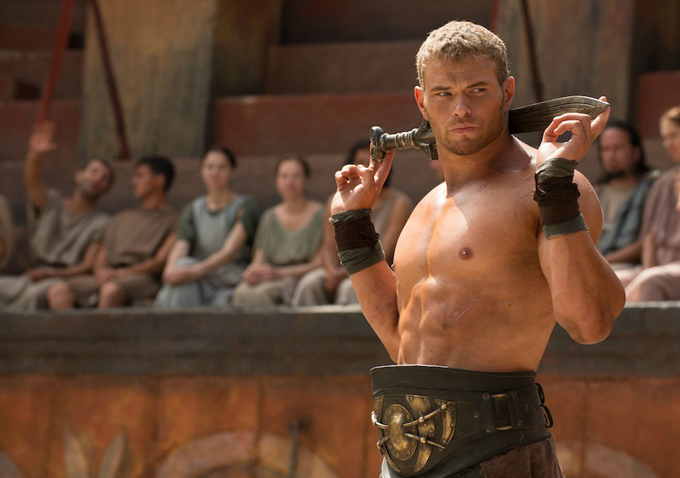
Last year, a pair of movies involving the White House being taken over by terrorists was released into theaters nationwide; one was a fairly cheap B-movie while the other was a sturdier, mainstream affair. This year, we’re getting two movies about Hercules, the mythological strongman who was the son of a god and a mortal woman. As always, the cheap one is opening first, as to not position itself as a quickie knockoff. While there’s a very big chance that “Hercules: The Thracian Wars,” out this summer, could be a major bummer, it’s hard to imagine anything being worse than this week’s repellant 3D wasteland “The Legend of Hercules,” a movie so ugly and woeful that you’ll wish you had superhuman strength to pluck your own eyeballs out of your head.

Since every major movie these days is an origin story, so too is “The Legend of Hercules.” Ostensibly based on the Greek legend, it instead uses that story as a loose diagram, oddly forgoing almost all of its mythological embellishments and tragic overtones. Instead, director Renny Harlin and his co-conspirators are happy to make a fitfully boring, pseudo-“Spartacus” riff devoid of tension, drama, or dizzying action set pieces. Instead, we get a tale where Hercules (Kellan Lutz, one of the living mannequins from the “Twilight” franchise) grows up without knowledge of his divine parentage, is eventually sold into slavery, then becomes a gladiatorial combatant and later leads a legion of fighters against the corrupt ruler (and his mortal father) King Amphitryon (Scott Adkins), while retrieving the hand of his bland true love Princess Hebe (Gaia Weiss) and besting his snotty brother Iphicles (Liam Garrigan). Sounds thrilling, doesn’t it? Well… it’s not.
Harlin has never been a director burdened by an abundance of imagination. As the filmmaker behind a number of successful (or nearly successful) mainstream action movies, his approach can easily be described as workmanlike. But one thing he’s never been is outright derivative; even when making a sequel like “Die Hard 2,” he eschewed the original film’s classy stylization for a morally questionable bloodbath that was so extreme it made you wonder if anyone involved in the sequel had even seen the first film. But here Harlin is content to go through the motions, endlessly aping the style of countless recent sword and sandal movies, most notably “300,” with the director even mimicking Zack Snyder‘s love of “speed ramping” – where a piece of action is slowed down dramatically before being immediately sped up.

The problem is that Harlin’s version of these flashy techniques innately feels like a rip-off, and a cheap, poorly photographed, post-converted-into-3D rip-off at that. Most of the action sequences either involve half-naked men competing in whatever the ancient Greek equivalent of mud wrestling is, or riding their horses over profoundly long distances, neither of which is all that gripping. Plus, you’ve seen it all before; there’s not a single moment of genuine wonder. Most of the time, the movie doesn’t seem like it was made so much as it was Xeroxed.
Building a movie around Lutz certainly doesn’t help matters. Yes, he’s handsome, with a physique that seems to have been chipped away from a single slab of granite or marble, but he can barely be bothered to emote, let alone anchor a bafflingly expensive ($70 million!) action epic. Most of the others default to an aristocratic British accent but Lutz can’t be bothered. Oftentimes Lutz looks uninterested in his own performance, and even his physicality is gummy and stilted; his motions and line readings are so robotic that at times “The Legend of Hercules” is less a movie and more like the “ancient Greek” scene from EPCOT’s Spaceship Earth, brought to life, complete with the waxy animatronic figures.

When an early adventure has Hercules slaying the Nemean lion, there seems to be a pretty good chance that the movie will follow the epic “Labors of Hercules” – the twelve quests Hercules had to complete to become a true hero. This approach would have given the movie shape and sizzle, considering how many buxom warriors and crazy beasts are contained within those twelve quests. Sadly this isn’t the case, and once Hercules bests the beast (which looks like a stuffed toy from FAO Schwartz), the movie falls into being hopelessly banal. This isn’t the Hercules who battled Ray Harryhausen‘s stop motion monsters or the Disney animated version, which repositioned the character like a mythological version of “Rocky.” Hell, this lacks even the zany fun of Arnold Schwarzenegger in “Hercules in New York.” There is very little mythic dimension to this movie and even less humor; it’s a grim and colorless affair.
At one point “The Legend of Hercules” was titled “Hercules: The Legend Begins,” which implied that the movie was the start of a brand new franchise. It’s not. Watching the film, it’s hard not to think back to the infamous memo Harlin sent out before shooting his giant-sized bomb “Cutthroat Island.” “No matter what the budget limitations or the physical handicaps are, we’ve got to offer the audience an unprecedented milestone in action and movie spectacle,” Harlin wrote. He went on: “No sequence or setting that you’ve seen in movies before is good enough.” In the nearly 20 years since “Cutthroat Island” was released, Harlin has not measurably matured as a filmmaker and his ambition, once wild and untamed and foolhardy, has all but disappeared. That’s a Greek tragedy in and of itself, because “The Legend of Hercules,” released in the second week of 2014, will probably be in the running as the worst movie of the year, when all is said and done. That is, unless the other Hercules movie is worse. [D-]

